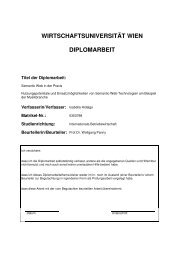Wirtschaftsuniversität Wien Magisterarbeit - SemanticLab
Wirtschaftsuniversität Wien Magisterarbeit - SemanticLab
Wirtschaftsuniversität Wien Magisterarbeit - SemanticLab
Create successful ePaper yourself
Turn your PDF publications into a flip-book with our unique Google optimized e-Paper software.
7. Conlusion<br />
At beginning of this thesis the question was raised how Internet users can make sure<br />
that their data is only used with their knowledge for the purpose they know and approve<br />
of. The answer to this question has been provided throughout this thesis:<br />
Basically, every user leaves traces behind when he or she surfs the Internet. The<br />
question is, if these traces can be used to profile users or even to track them down<br />
physically. The answer to this question is that yes, if users are not concerned enough<br />
about their privacy on the Internet, all these things are technically possible. But not all<br />
those possibilities are per se “evil”. The Internet revolutionized the way people work,<br />
how they shop or pay their taxes. They do this by using online services. These services<br />
often need a certain amount of data to function: imaging an e-government service where<br />
your identity is not checked. Or a webshop which is not able to deliver the goods<br />
purchased because it lacks the information about the home address. The point is that<br />
there is a tradeoff between privacy and functionality on the Internet and users have<br />
to deal with it and should always be aware of it when they are using privacy sensitive<br />
applications.<br />
However, the recent Facebook privacy scandal shows that not all privacy sensitive<br />
applications should be used without clearly thinking about what data one wants to<br />
share with the application - because dozens of other users or applications may be granted<br />
access to this data. Another lesson that one may learn from this recent issue is that<br />
the Internet community can be very powerful. Facebook did not inform its users about<br />
the change of Terms of Service, however, a team of bloggers found out and within a<br />
short period of time, the news spread the Internet, starting from blogs until it reached<br />
even the (offline) newspapers. After a huge outcry, Facebook reverted the changes in<br />
its Terms of Service due to the public pressure. This is an example where the Internet<br />
community successfully controlled itself - but that does not necessarily always has to be<br />
the case. And that is why privacy standards and clients which support these standards<br />
are necessary.<br />
Ideally, privacy standards make sure that user-data is only used with the knowledge<br />
and for the purpose users know and approve of. However, there are four important<br />
questions to ask when it comes to privacy standards on the Internet: (1)Are these privacy<br />
standards actually widely accepted? (2)If so, are they implemented on a broad basis?<br />
(And are they then implemented as designed or is the implementation just a case of<br />
window-dressing? (3)Is there client-software available which actually implements these<br />
privacy standards in a user-friendly way? and more importantly (4)Are users actually<br />
aware of the issues these standards try to protect them of?<br />
Take P3P for example. The P3P 1.0 recommendation was officially published in<br />
April 2002, version 1.1 of the specification in November 2006. Yet, there is no full<br />
69





